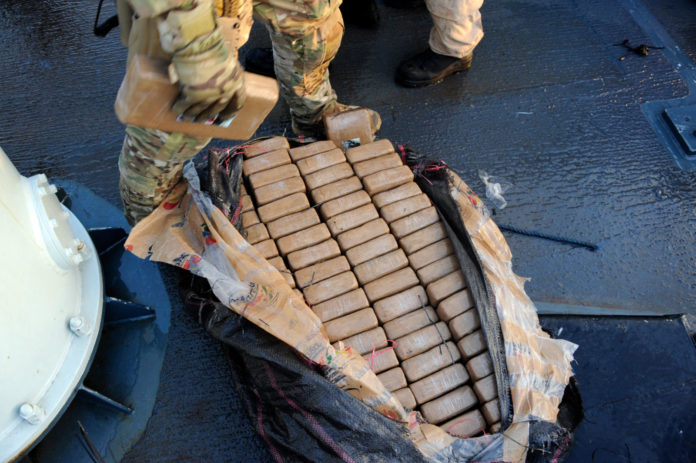
MIAMI — The crew of the Coast Guard Cutter Legare is scheduled to offload approximately 12 tons of cocaine and 1 ton of marijuana Tuesday in Port Everglades worth an estimated $390 million total wholesale seized in international waters in the Eastern Pacific Ocean.
US Coast Guard Offloads 12 Tons of Cocaine, 1 Ton of Marijuana In Florida – https://t.co/s73MSAsk9N pic.twitter.com/Wl0Irx4lCR
— Breaking911 (@Breaking911) April 24, 2018
The drugs were interdicted off the coasts of Mexico, Central, and South America by multiple U.S. Coast Guard cutters and Canadian Naval vessels.
The offload represents 17 separate suspected drug smuggling vessel interdictions by:
- The Coast Guard Cutter Reliance was responsible for one case, seizing an estimated 1,200
kilograms of marijuana.
- The Coast Guard Cutter Legare was responsible for five cases, seizing an estimated 2,051
kilograms of cocaine and 8 kilograms of marijuana.
- The Coast Guard Cutter Harriet Lane was responsible for one case, seizing an estimated 907
kilograms of cocaine.
- The Coast Guard Cutter Decisive was responsible for two cases, seizing an estimated 430
kilograms of cocaine.
- The Coast Guard Cutter Steadfast was responsible for four cases seizing an estimated 1730
kilograms of cocaine.
- HMCS Whitehorse was responsible for two cases, seizing an estimated 1,540kilograms of cocaine.
- HMCS Edmonton was responsible for one case, seizing an estimated 451kilograms of cocaine.
kilograms of cocaine.
- The Coast Guard Cutter Dependable was responsible for one case seizing an estimated 454
kilograms of cocaine.
Numerous U.S. agencies from the Departments of Defense, Justice and Homeland Security are involved in the effort to combat transnational organized crime. The Coast Guard, Navy, Customs and Border Protection, FBI, Drug Enforcement Administration, and Immigration and Customs Enforcement along with allied and international partner agencies play a role in counter-drug operations. The fight against transnational organized crime networks in the Eastern Pacific requires unity of effort in all phases from detection, monitoring, and interdictions to prosecutions by several U.S. Attorneys’ offices around the nation and authorities in partner nations.
“What these numbers represent is an increased commitment by U.S. and international partners to combat transnational criminal networks and promote stability in the Central American region, along the U.S. southern border, and in the southern maritime approaches to the U.S.,” said Cmdr. Jonathan Carter, commanding officer of Legare. “Today’s offload sends them a message that our network of partners and allies remains resolute in our commitment to stem the flow of illicit trafficking that breeds instability.”
The Coast Guard increased the U.S. and allied presence in the Eastern Pacific Ocean and Caribbean Basin, which are known drug transit zones off of Central and South America, as part of its Western Hemisphere Strategy. During at-sea interdictions in international waters, a suspect vessel is initially located and tracked by allied, military or law enforcement personnel. The interdictions, including the actual boarding, are led and conducted by U.S. Coast Guardsmen. The law enforcement phase of counter-smuggling operations in the Eastern Pacific is conducted under the authority of the Coast Guard 11th District headquartered in Alameda, California.

